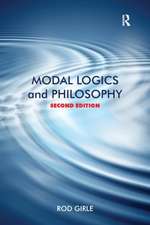Philosophy of Mind in the Early and High Middle Ages: The History of the Philosophy of Mind, Volume 2: The History of the Philosophy of Mind
Editat de Margaret Cameronen Limba Engleză Paperback – 18 dec 2020
Following an introduction by Margaret Cameron, twelve specially commissioned chapters by an international team of contributors discuss key topics, thinkers and debates, including:
- mental perception;
- Avicenna and the intellectual abstraction of intelligibles;
- Duns Scotus;
- soul, will, and choice in Islamic and Jewish contexts;
- perceptual experience;
- the systematization of the passions;
- the complexity of the soul and the problem of unity;
- the phenomenology of immortality;
- morality; and
- the self.
Essential reading for students and researchers in philosophy of mind, medieval philosophy, and the history of philosophy, Philosophy of Mind in the Early and High Middle Ages is also a valuable resource for those in related disciplines such as Religion.
| Toate formatele și edițiile | Preț | Express |
|---|---|---|
| Paperback (1) | 323.28 lei 6-8 săpt. | |
| Taylor & Francis – 18 dec 2020 | 323.28 lei 6-8 săpt. | |
| Hardback (1) | 1004.20 lei 6-8 săpt. | |
| Taylor & Francis – 27 iun 2018 | 1004.20 lei 6-8 săpt. |
Preț: 323.28 lei
Nou
Puncte Express: 485
Preț estimativ în valută:
61.86€ • 64.59$ • 51.08£
61.86€ • 64.59$ • 51.08£
Carte tipărită la comandă
Livrare economică 15-29 aprilie
Preluare comenzi: 021 569.72.76
Specificații
ISBN-13: 9780367734152
ISBN-10: 036773415X
Pagini: 253
Dimensiuni: 156 x 234 x 18 mm
Greutate: 0.45 kg
Ediția:1
Editura: Taylor & Francis
Colecția Routledge
Seria The History of the Philosophy of Mind
Locul publicării:Oxford, United Kingdom
ISBN-10: 036773415X
Pagini: 253
Dimensiuni: 156 x 234 x 18 mm
Greutate: 0.45 kg
Ediția:1
Editura: Taylor & Francis
Colecția Routledge
Seria The History of the Philosophy of Mind
Locul publicării:Oxford, United Kingdom
Public țintă
Postgraduate and UndergraduateCuprins
Introduction Margaret Cameron 1. Peter Abelard on Mental Perception Margaret Cameron 2. The Problem of Intellectual Cognition of Material Singulars between 1250 – 1310 David Piché 3. Avicenna and the Issue of Intellectual Abstraction of Intelligibles Richard Taylor 4. Duns Scotus on Freedom as a Pure Perfection: Necessity and Contingency Cruz González-Ayesta 5. Soul, Will, and Choice in Islamic and Jewish Contexts Sarah Pessin 6. Perceptual Experience: Assembling a Medieval Picture Juhana Toivanen 7. The Systematization of the Passions in the Thirteenth Century Henrik Lagerlund 8. Soul and Agent Intellect in Avicenna and Aquinas Kara Richardson 9. The Complexity of the Soul and the Problem of Unity in the Thirteenth Century Andrew Arlig 10. The Phenomenology of Immortality (1200 – 1400) Christina Van Dyke 11. Morality Peter Eardley 12. The Self John Marenbon. Index
Notă biografică
Margaret Cameron is Canada Research Council Chair in the Aristotelian Tradition (Tier II) and an associate professor in the Department of Philosophy at the University of Victoria, Canada. She works in the Aristotelian tradition of logic and philosophy of language, as well as the history of the philosophy of language more broadly, and has published articles in The Cambridge Companion to Boethius, The Oxford Handbook of Medieval Philosophy, Vivarium, History of Philosophy Quarterly, American Catholic Philosophy Quarterly, and the Archives d’histoire doctrinale du moyen âge grec et latin, as well as in a number of other book publications.
Recenzii
Praise for this volume:
'This book is the second volume in a six-part history of the philosophy of mind that is designed to cover the entire history of philosophy, from antiquity to the present. Although some of the chapters focus on individual thinkers, the volume is organized thematically so that each chapter addresses its topic independently [...] the book is a valuable entry into some of the central debates in the medieval philosophy of mind.' - Jari Kaukua, University of Jyväskylä, Finland
Praise for The History of the Philosophy of Mind:
'A monumental resource for anyone interested in the human mind and the history of philosophical attempts to understand it. Students who consult these volumes will appreciate the multiple branching paths that connect past philosophical writings to those of the present. The juxtapositions of topics and historical figures in each volume can help researchers in contemporary philosophy of mind identify precedents for contemporary positions.' - Susanna Siegel, Harvard University, USA
'This six-volume history of the philosophy of mind is a compendious tour-de-force, tracing the sources of modern problems to a vibrant philosophical conversation ranging from antiquity to the present day. This is a special and uniquely wide-ranging resource for anyone, from the novice to the expert, with an interest in the nature of mind and its faculties, as well as its relation to the body and the physical world.' - Samuel Rickless, University of California San Diego, USA
'These six volumes constitute an invaluable resource for anyone interested in the philosophy of mind and the history of philosophy – as well as metaphysics, psychology, and cognitive science – and I recommend them, with great enthusiasm, to all. Together they illuminate areas of inquiry that may b
'This book is the second volume in a six-part history of the philosophy of mind that is designed to cover the entire history of philosophy, from antiquity to the present. Although some of the chapters focus on individual thinkers, the volume is organized thematically so that each chapter addresses its topic independently [...] the book is a valuable entry into some of the central debates in the medieval philosophy of mind.' - Jari Kaukua, University of Jyväskylä, Finland
Praise for The History of the Philosophy of Mind:
'A monumental resource for anyone interested in the human mind and the history of philosophical attempts to understand it. Students who consult these volumes will appreciate the multiple branching paths that connect past philosophical writings to those of the present. The juxtapositions of topics and historical figures in each volume can help researchers in contemporary philosophy of mind identify precedents for contemporary positions.' - Susanna Siegel, Harvard University, USA
'This six-volume history of the philosophy of mind is a compendious tour-de-force, tracing the sources of modern problems to a vibrant philosophical conversation ranging from antiquity to the present day. This is a special and uniquely wide-ranging resource for anyone, from the novice to the expert, with an interest in the nature of mind and its faculties, as well as its relation to the body and the physical world.' - Samuel Rickless, University of California San Diego, USA
'These six volumes constitute an invaluable resource for anyone interested in the philosophy of mind and the history of philosophy – as well as metaphysics, psychology, and cognitive science – and I recommend them, with great enthusiasm, to all. Together they illuminate areas of inquiry that may b
Descriere
Philosophy of Mind in the Early and High Middle Ages provides an outstanding overview to a tumultuous 900-year period of discovery, innovation, and intellectual controversy that began with the Roman senator Boethius (c480-524) and concluded with the Franciscan theologian and philosopher John Duns Scotus (c1266-1308). Relatively neglecte


















